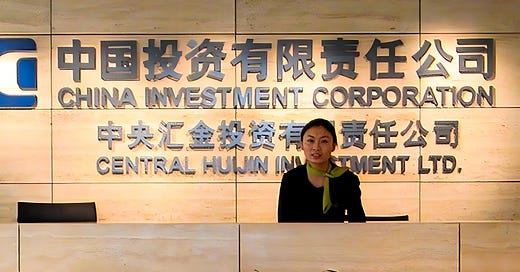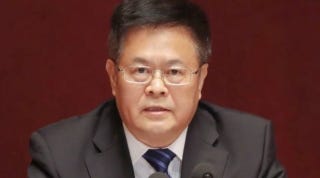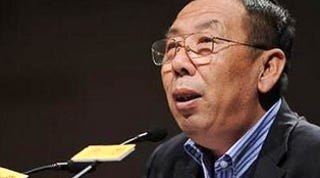‘doing our own thing well’: Beijing scales up scitech funding
pushing scitech frontiers is still top policy
Welcome everyone!
We’ve been hearing Beijing talk up ‘doing our own thing well’ since the days of Mao; under Xi Jinping, it again became popular. Now, facing the Trump administration, the volume has turned right up.
I’m sure you know Beijing is investing big in scitech… here are some of the recent details.
Philippa
With US tariff exactions and threats yet to bottom out, Beijing is only more convinced that its scitech self-reliance strategy has been the right one
The quantum of the hit to PRC exports, a major driver of GDP, is yet to become clear amid the tariff turmoil. One sure thing is that piping cash to innovative firms will be ever more Beijing’s focus.
Change is afoot in scitech finance. A new round of financial tinkering was signalled in 'Opinions' on reaching Beijing’s five financial targets. Published on 7 February (before the Two Sessions, held 5–11 March 2025), the Opinions placed scitech as the top financing priority. Multi-faceted, they guarantee ample funding for tech firms from startup to IPO, explains Zheng Dengjin 郑登津 Central University of Finance and Economics. Further moves were hinted at in calls to create ‘diverse’ equity and ‘multi-layered’ bond markets.
The transfer of three large asset management companies from MoF (Ministry of Finance) to the PRC’s sovereign wealth fund on 18 February 2025 prefigures more consolidation. It followed some high-profile mergers of securities firms in Q1 2025: the centre, it seems, is making preparations.
No doubt, capitalising on a stock market rally triggered by January 2025’s Deepseek moment, the Two Sessions featured a strong push on scitech financing. Ranging from capital markets to bank loans, new measures sought to tackle funding shortfalls, including
expanding asset investment company pilots
more banks to participate
pilots to include 18 provinces
allowing insurance funds to participate
expanding insurance fund investment pilots
increasing technology company M&A support
raising re-lending from 60 to 80 percent of loan value
extending terms from seven to ten years
piloting further use of IP (intellectual property) in financing
streamlining IP pledge registration
Capital markets remain at the forefront as ever, essential for advanced industry and innovation, insists Wu Qing 吴清 CSRC (China Securities Regulatory Commission).
A recent attempt to right markets since September 2024’s monetary stimulus has returned to the drawing board, now with fiscal heft. With markets bullish on PRC tech yet rocked by tariff disruptions, could chronic declines in stock prices and bond financing find solutions?
turning to bonds
A turn away from equities and towards bonds is a lever for funding tech firms. PBoC (the People’s Bank of China) and regulators will create a ‘technology board’ within bond markets, a dedicated space for scitech firms to raise capital, Pan Gongsheng 潘功胜 PBoC Governor told the 2025 Two Sessions. Beyond innovative firms themselves, financial institutions and investment funds will be authorised to raise cash for scitech investment via bond issuance. This comes at an opportune time: interest rates are low, and demand for securities historic. Is Beijing shifting from equities to bonds?
First appearing in March 2021, innovation bonds saw some C¥2.6 tn issued by March 2025, reports China Securities. However, issues remain: coupon durations are too short, usually under three years, and are ill-matched with the long-term financing needs of unprofitable startups. Bonds are overwhelmingly (90 percent) issued by SOEs, with smaller private firms largely cut out. Funds may well miss innovation targets: 30 percent go to developers, 10 percent to local government financing vehicles. These are hardly the ‘hard tech’ firms imagined driving the future economy,
The launch of the tech board assumes innovation bonds moving from the pilot stage to a regular tool, contends Jiang Zhan 蒋展 Shanghai Jiaotong University. Bond markets are being shifted towards tech concerns, including investment funds, in the hope of reaching smaller private firms eventually. Yet mandating this entails shoring up credit ratings and market design: underwriting the existence of a high-risk, high-yield segment serving riskier startup needs, explains Zhang Lin 张林 Fareast Credit.
sworn to equities
Hope springs eternal for scitech self-reliance fuelled by a robust equities market. Beijing will raise C¥1 tn to create a national venture capital state guidance fund, announced Zheng Shanjie 郑栅洁 NDRC (National Development and Reform Commission) director, earmarked for future industries like biomanufacturing, 6G and embodied AI.
This will dwarf previous central guidance funds, not least C¥344 bn raised in the IC fund’s third round. This is a serious effort from Beijing to directly expand patient capital rather than via third parties like insurance funds. It betokens a VC market transformed from market- to state-driven, a state-owned fund manager told the Economic Observer.
Strategy is shifting from 'fixing weak links' to 'building strong foundations' in tech innovation, claims Tian Lihui 田利辉 Nankai University Institute of Financial Development. The scale would be impressive: a national fund yield of 30 percent of capital would leverage up to C¥4 tn (US$560 bn) in sub-funds, making it a prime mover in the PRC’s VC landscape, argues Fang Jianhua 方建华 Hefei Guoke Xinneng Equity Investment.
The fund will solve VC industry issues, hopes Zhu Changming 朱昌明 Sunshine Law Firm, erasing memories of declining fundraising. Investment term limits provide a watershed: will ‘5+2’ year terms, typical of the industry, continue in use, or will a more long-term approach prevail? Beijing is leaning towards the latter, and Wu Qing thinks ten years of patience can produce true brilliance.
staying the course
Localities already follow Beijing’s lead. Shenzhen’s financial regulator, PBoC, financial institutions and related firms held an extended meeting on 14 March 2025 to discuss improved tech financing. Topics included getting funding to SMEs and improving risk sharing.
So how can scitech success be reconciled with persistent negativity? The PRC may become a tech superpower with a feeble economy, warns veteran contrarian Sun Liping 孙立平, pouring trademark cold water on state-sponsored elation. Sun’s misgivings typify ill-concealed dissatisfaction with Beijing’s techno-modernist path. So, too, do PRC attacks on ‘accelerationism’ allegedly a utopian delusion of Trump 2.0 and the likes of Elon Musk.
Beijing, however, remains unfazed. Given the long-predicted trade war, it is even more likely to double down.
a supporter and a realist
Zheng Shanjie 郑栅洁 | NDRC director
Beijing remains focused on the scitech march to solve its economic troubles, implied Zheng in his Two Sessions press conference. The PRC is a massive economy that is ever more driven by advanced manufacturing, with historically high exports proving its competitiveness. Momentum is strong: strategic emerging and future industries are all making breakthroughs. These all manifest the centre’s promise to raise economic efficiency and plan high-quality development.
This year will again be dedicated to improving social services while focusing on quickening the pace of industry upgrading and creating new growth drivers. Nurturing new productive forces has NDRC focused on funds, personnel and the innovation environment. Getting funds to enterprises remains a focus of central planning: NDRC will support the VC fund while encouraging more M&As and the creation of secondary market funds to loosen blockages to exits further.
Zheng’s career is rooted in industrial management and regional governance. After graduating from Nanjing Tech University in 1982, he was a factory manager for 15 years, then an official in Fujian. Known as a pragmatist, he rose through roles in Xiamen, Zhejiang (as Ningbo Party Secretary and Governor), and Anhui (as Party Secretary); he is politically linked with to Xi Jinping’s 'army' due to overlapping Fujian tenures and his alignment with Xi’s economic convictions. His NDRC role suggests trust from Beijing’s top leadership, including ties to figures like Premier Li Qiang. A technocrat focusing on actionable policy—e.g. overseeing fiscal measures in 2024—Zheng is deemed a reliable, low-profile implementer of the Party’s convictions.
Sun Liping 孙立平 | Tsinghua University sociology professor
Disputing the triumphalism sparked by the Deepseek moment, veteran social critic Sun remains sceptical of efforts to nurture innovation or the economy it is imagined fostering. Accepting prospects of the PRC leading the world in key segments, he is wary of praise gushing from domestic and foreign sources. The point insists Sun is ensuring PRC citizens live with dignity.
He recalls that the Soviet Union launched its first space satellite in 1957, no small achievement. But it would take another 12 years for it to manufacture its first roll of toilet paper using UK equipment.
The lesson is harsh: a state can focus on innovation, but this may fail to improve living standards. Technological and economic objectives diverge in today’s PRC; Beijing appears to be in denial.
Native of rural Hebei, born in 1959, Sun was a journalism major at Peking University 1978–81, moving to sociology at Nankai University 1981–83. Long a working journalist, he joined Tsinghua University in 1993. He famously helped advise a younger Xi Jinping’s PhD dissertation. The resulting political capital arguably allowed him to test the limits of objective reporting.
Economic growth has overtaken politics, argues his 1996 bestseller, The Road to Modernisation, breeding corruption, inequity, and unrest. With some 300 colleagues, Sun co-signed the ‘Charter 08’ open letter to the Party, urging political reform. He warned Caijing Magazine’s annual Forecasting and Strategy conference in 2013 of a ‘crisis of legitimacy.’ Widely reported, this was a harbinger of the impending Xi era. Other notable works include Social Reconstruction (2009), China’s Political Reform (2011), and Crisis of Legitimacy (2013).







